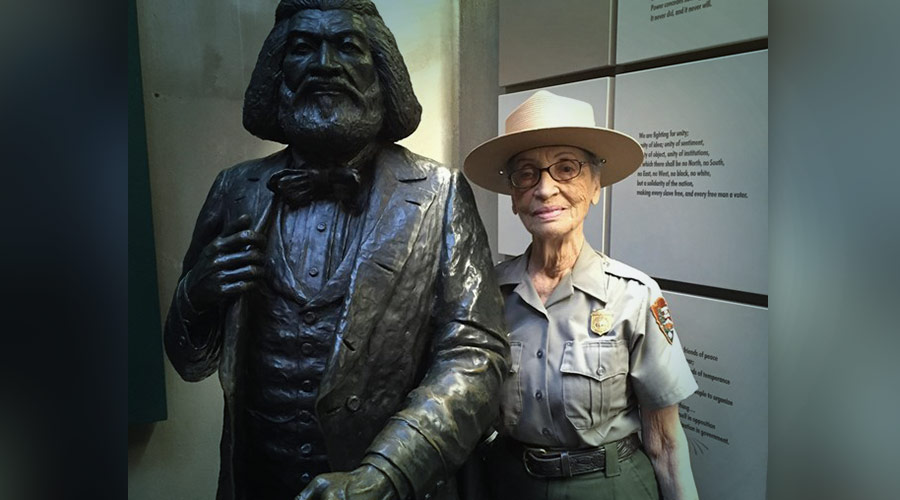Since its founding in 1916, the National Parks Service has helped conserve the natural and cultural resources of the United States by preserving local history, celebrating local heritage and creating educational outdoor opportunities for tourists across the country. Their official charitable organization, The National Park Foundation, enriches national parks and programs even further through philanthropic support from private citizens, park lovers and history enthusiasts.
In September, The New York Times profiled Betty Reid Soskin, the oldest active park ranger in the National Park Service. Soskin celebrated her 100th Birthday on September 22, and has worked at The Rosie the Riveter World War II Home Front National Historical Park in Richmond, California for the last decade and a half. Kindly described by a colleague as “Bette Davis, Angela Davis and Yoda all rolled into one,” Soskin’s personal story has become an integral part of Black history preserved at the historic park.
Long before she became a ranger, Soskin was a file clerk in a segregated unit of the historically all-white Boilermakers union during World War II. Flash forward to her first tour of the national historic park, she noticed there were few civilian stories told from the perspective of people of color. “Without Betty’s influence, we probably would not have told various previously marginalized stories in as much depth,” said park Superintendent Tom Leatherman.
Robert F. Smith’s Commitment to Preserving Black History in National Parks
Like Soskin, Robert F. Smith is dedicated to preserving and celebrating African-American history and culture. As a lover of the outdoors, many of Smith’s philanthropic efforts directly support the National Park Foundation.
In 2019, Fund II Foundation, of which Smith is founding director and President, made a generous donation to the National Park Foundation to help purchase the homes where Dr. Martin Luther King Jr. was born and raised his family. From this donation, the homes were transferred to the National Park Service and forever preserved as the Martin Luther King Jr. National Historical Park in Atlanta, Georgia.
“A key component of Fund II Foundation’s mission is to bring African-American history to life and preserve it for generations,” said Smith about the donation. “This grant will help make it possible for all people to experience and learn first-hand about Dr. King’s legacy and the civil rights stories that are part of our shared American heritage.”
In 2021, Fund II Foundation made another donation to the National Park Foundation to contribute to the opening of the Pullman National Monument in Chicago, Illinois. The historic clock tower building is home to a new visitor’s center, and along with the surrounding grounds, is the latest Black historic site to be preserved under the National Park Foundation. “Pullman Porters helped shape our American history, giving rise to the labor movement and it is important to honor them now and share their stories with current and future generations,” said Smith about the site’s opening.
Smith himself has a family connection to the Pullman National Monument. He commented on it this year as a part of the celebration of the opening. “I personally am moved by this story; my father and grandfather, both named William Smith; served on the railroad as waiter and porter. So, this is especially sweet,” he said.
Learn more about Robert F. Smith’s philanthropic vision and Fund II Foundation’s work to preserve the African-American experience in our national parks, and beyond.






